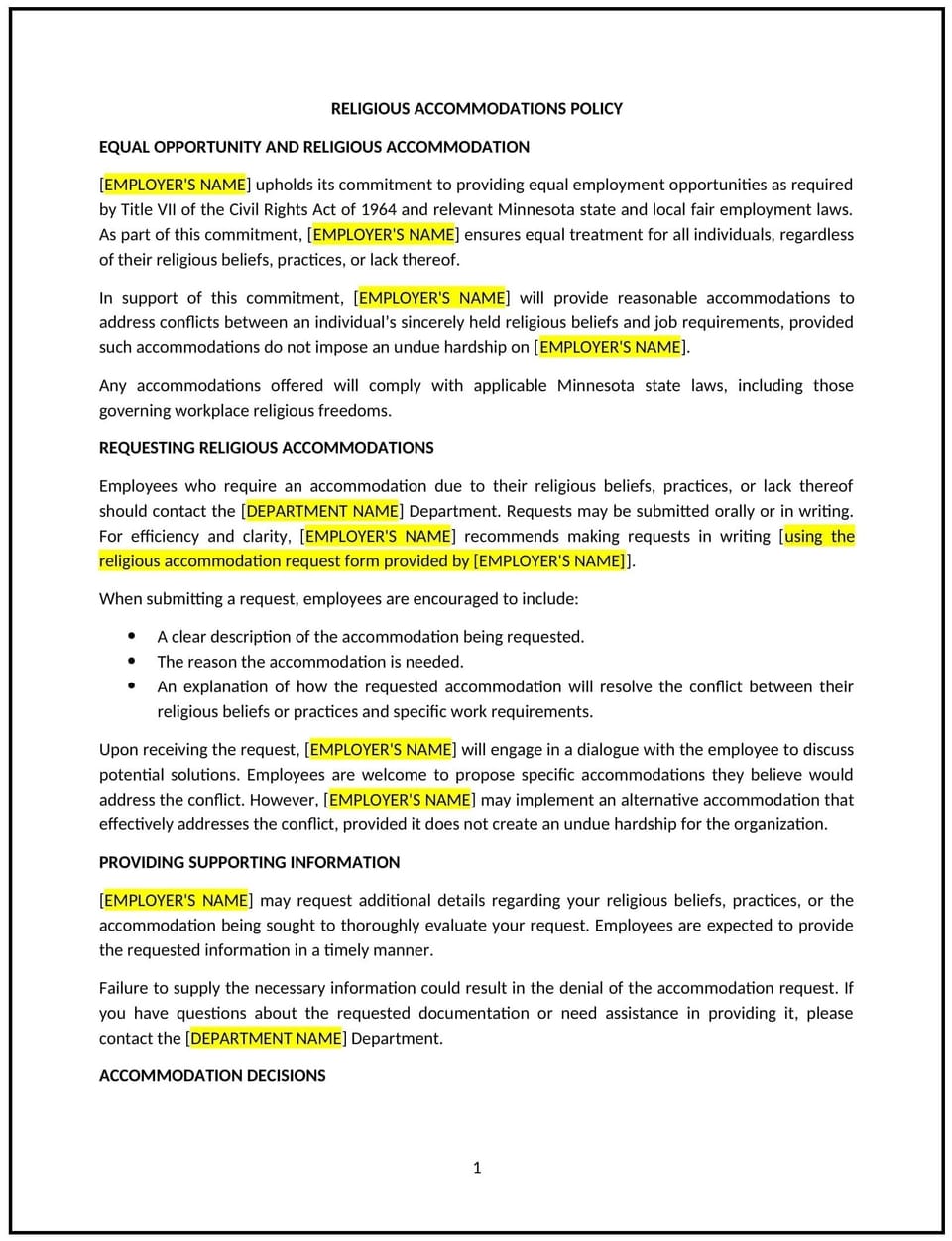Religious accommodations policy (Minnesota): Free template

Religious accommodations policy (Minnesota)
This religious accommodations policy is designed to help Minnesota businesses provide reasonable accommodations for employees’ religious practices and beliefs, as required by state and federal law. The policy outlines the company’s approach to accommodating religious observances, such as prayer, holidays, or dress codes, while balancing operational needs and promoting an inclusive work environment.
By implementing this policy, businesses can create a supportive workplace for employees of all faiths, ensure that religious practices are respected, and minimize the risk of discrimination claims.
How to use this religious accommodations policy (Minnesota)
- Define religious accommodations: Clearly specify what constitutes a religious accommodation, such as time off for religious holidays, prayer breaks, religious dress codes, or flexibility in work schedules.
- Address reasonable accommodation requests: Outline the process for employees to request religious accommodations, including how to submit requests, the timeline for approval, and any required documentation, such as religious observance dates.
- Evaluate each request individually: Each accommodation request should be evaluated on a case-by-case basis, considering the nature of the religious practice and how it might impact the workplace, as well as the employee’s specific needs.
- Balance business operations: While accommodating religious practices, ensure that accommodations do not unduly disrupt business operations or create an undue hardship for the company. Clearly define what constitutes “undue hardship” under Minnesota law.
- Respect privacy: Maintain confidentiality about religious beliefs and practices. Employees should feel comfortable discussing their religious accommodation needs without fear of discrimination or retaliation.
- Set expectations for communication: Establish a clear process for ongoing communication between employees and management regarding religious accommodations, ensuring that both parties are aware of any changes to work schedules or expectations.
- Address conflicts: If a requested accommodation conflicts with business operations or other employees' rights, address the situation in a respectful and constructive manner, seeking to find a mutually beneficial solution.
Benefits of using a religious accommodations policy (Minnesota)
Implementing this policy provides several advantages for Minnesota businesses:
- Fosters inclusivity: A clear policy ensures that all employees feel respected and supported, regardless of their religious background, promoting an inclusive and diverse work environment.
- Reduces legal risk: By proactively addressing religious accommodations, businesses can reduce the risk of legal claims related to religious discrimination under Minnesota state laws and federal regulations.
- Enhances employee satisfaction: Employees who feel their religious beliefs are respected are more likely to be satisfied with their job, leading to higher engagement, morale, and retention.
- Promotes workplace harmony: By accommodating religious practices, businesses help to create a harmonious work environment where all employees are valued and treated fairly.
- Reflects Minnesota-specific considerations: The policy can be tailored to Minnesota’s labor laws and the state’s diverse workforce, ensuring that it aligns with local expectations and best practices.
Tips for using this religious accommodations policy (Minnesota)
- Communicate clearly: Ensure that all employees are informed about the policy and understand how to request accommodations for religious practices, including the process and any necessary documentation.
- Encourage open dialogue: Foster an open, non-judgmental dialogue between employees and managers regarding religious needs, ensuring that both parties can address concerns and find reasonable solutions.
- Be flexible: While maintaining operational requirements, be flexible in accommodating religious practices, especially for requests related to religious observances, prayer times, or dress codes.
- Review regularly: Periodically review the policy to ensure it remains aligned with Minnesota’s evolving labor laws and the changing needs of the workforce.
Q: What are religious accommodations?
A: Religious accommodations refer to adjustments made in the workplace to allow employees to practice their religion, such as time off for religious holidays, flexible work hours, or permission to wear religious attire.
Q: How can employees request religious accommodations?
A: Employees should submit a request for religious accommodation to their manager or HR, specifying the nature of the request, the religious practice involved, and any supporting documentation if needed.
Q: Can a business deny a religious accommodation?
A: Businesses can deny a religious accommodation if it would create an undue hardship, such as significant disruption to operations or an unreasonable financial burden. However, all accommodation requests should be evaluated on a case-by-case basis.
Q: Are employees required to provide documentation for religious accommodations?
A: While documentation may be required in some cases (e.g., to verify the religious observance), businesses should avoid making the process burdensome and ensure that employees’ religious practices are respected without excessive documentation requirements.
Q: What if a religious accommodation conflicts with another employee’s needs?
A: If a religious accommodation conflicts with other employees’ rights or operational needs, businesses should work with the affected parties to find a mutually acceptable solution that respects both individuals' rights and the company’s needs.
Q: How do we ensure that all employees are treated fairly with regard to religious accommodations?
A: Businesses should apply the policy consistently across all employees and ensure that accommodations are made on a case-by-case basis, taking into account both the employee’s religious needs and the business’s operational requirements.
Q: What if an employee feels their religious accommodation request was denied unfairly?
A: Employees who feel their request was unfairly denied should be encouraged to discuss the matter with HR or management to resolve the issue. The business should work to ensure that any concerns are addressed in a respectful and timely manner.
Q: How often should this policy be reviewed?
A: The policy should be reviewed annually or whenever there are significant changes to Minnesota’s laws, employee feedback, or business practices that may affect how religious accommodations are handled.
This article contains general legal information and does not contain legal advice. Cobrief is not a law firm or a substitute for an attorney or law firm. The law is complex and changes often. For legal advice, please ask a lawyer.


